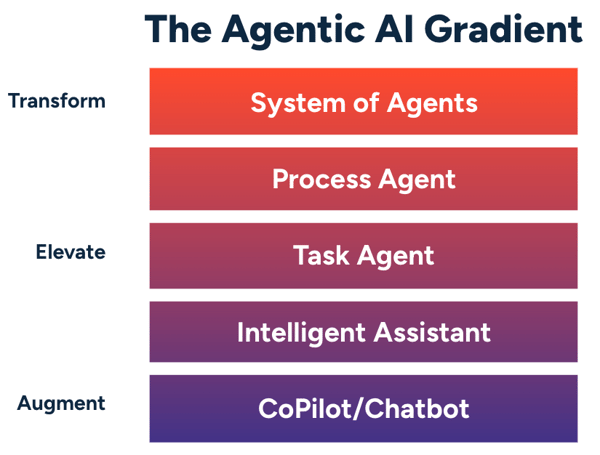“AI is no longer a tool. It’s integrated into how we work; it’s a business imperative.”
These are wise words recently spoken by our CMO, Sydney Sloan, who opened this year’s G2 Reach event by inviting C-suite executives, go-to-market (GTM) leaders, and innovative strategists across B2B SaaS to discuss the transformative role of AI in today’s business environment.
As someone who’s been deeply immersed in technological transformations for decades, I’ve witnessed firsthand how breakthrough innovations can fundamentally reshape our professional world. Still, we’ve only just scratched the surface of AI’s application in business. I believe its evolution will be as transformative as the invention of the light bulb during the Industrial Revolution.
Recognizing AI is a business imperative, where should we focus our intentions and efforts? What trends should we capitalize on to ensure our businesses can keep up with the pace of change, moving at the speed of AI? In my Reach session, I helped narrow the focus, shedding light on the three AI mega trends to watch, understand, and evolve alongside.
1. The Rise of Agentic AI: Beyond Suggestions to Action
Agentic AI represents a transformative leap beyond traditional AI, shifting from passive suggestion to autonomous action. It sits on a spectrum of different capabilities, which I call the Agentic AI Gradient.


Where conventional AI tools merely augment human capabilities by providing recommendations, Agentic AI reasons through complex problems, creates comprehensive action plans, and executes them with minimal human intervention.
This fundamental transformation is not just about working faster—it’s about reimagining work, building on AI’s ability to decouple prediction from judgment, and creating systems that can independently solve strategic challenges. Agents solve “the Delivery Problem” between individual efficiency and organizational value creation.
2. The Emergence of the “Answer Economy”
We’re quickly transitioning from search-based research to an answer-driven style of learning, buying, and working. Technical buyers and CTOs, for example, are becoming early adopters of AI search technologies that provide direct, contextual responses rather than keyword matches. G2 research reveals that traditional search has been a bottleneck in their buying journey, which AI search can solve.
As a result, search traffic will decrease as more trusted AI leads to a surge in zero-click searches. This means that search will lead to less traffic, except for those few citations that serve as the source of AI’s answers. It’s more important than ever to be that source or for the answer to suggest your software solution.
To adapt to this shift, companies need to focus on user-generated and high-quality narrative content that will enable them to engage with and, more importantly, own their audience. In the short term, they’ll need to invest a percentage of their SEO budget into Generative Engine Optimization services.
3. The Financial Imperative: Measuring AI Utilization
The most crucial challenge for business leaders isn’t implementing AI—it’s ensuring meaningful utilization. Businesses must be mindful of the rise of “shelfware” associated with AI-led companies, which refers to software that’s purchased but not utilized. With this in mind, CFOs are laser-focused on measuring the real-world impact of AI investments—the utilization of their AI-powered software tools as their new primary metric to project business impact and success.
As the need to provide faster ROI from AI software investments persists, leaders must prioritize user adoption from the moment of purchase, design integration strategies that demonstrate immediate value, and continuously measure and improve utilization rates. To prevent churn, they must amp up user utilization to raise quitting costs. In most situations, the customer doesn’t switch; they go back to what they had before.
A Final Perspective
Leaders who implement a few immediate actions will reap the most benefits from AI as its capabilities continue to evolve:
Explore Agentic AI Platforms
- Investigate tools that move beyond suggestions to actionable insights
- Consider how different agents can work together to achieve desired outcomes
- Get started, based on applying agents to address key Go-To-Market challenges.
Develop Intent-Driven Content
- Shift from keyword optimization to understanding user intent
- Create narrative-rich, high-quality content
- Optimize your digital presence for AI search
- Look for opportunities to augment, not replace, human expertise
Focus on High-Impact Use Cases
- Prioritize applications in customer service, sales, and marketing
Measure Utilization Meticulously
- Track how consistently your team leverages AI tools
- Design enablement programs that drive deep integration
AI now stands for “Always Included,” representing a strategic imperative for forward-thinking organizations and software companies of all types. The future belongs to those who understand that AI isn’t about replacing human expertise but amplifying our ability to deliver predictable results in the face of a more complex landscape.
And the future belongs to the curious.
If you missed it, you can view my full session on “The 3 AI-Mega Trends We’re Watching at G2” and access every session from Reach on-demand here.

